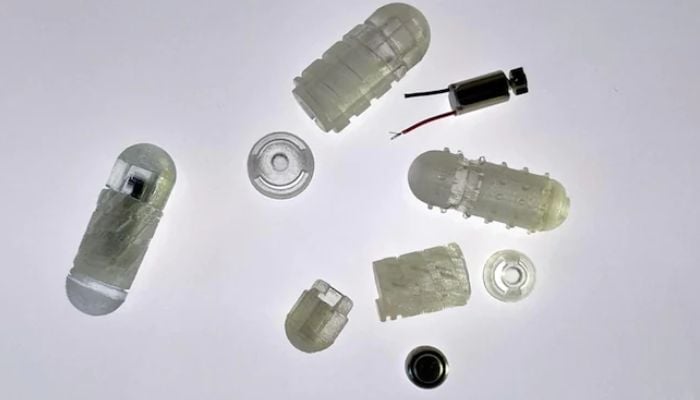VIDEO: Robotic pill that tunnels through mucus to deliver drug
"I was watching videos of these machines that can make tunnels and I thought, 'OK, what if we did this for mucus,'" says lead researcher
Experts are always researching drug delivery, trying to find better ways to deliver medicine to the regions of the body that need it and fight barriers like acidic areas in the stomach and mucus lines in the digestive tract.
In their struggle to resolve these issues, Massachusetts Institute of Technology (MIT) researchers developed a robotic pill that can be taken orally to replace high-protein drugs like insulin that are usually only injected.
RoboCap, as the name suggests, has a robotic cap that protects the medicine from the mucus barrier in the small intestine and helps it pass into the cells. This cap tunnels its way through the body, according to researchers. It propels itself through the viscous mucus.
"We could deposit the drug directly on the epithelium," said lead researcher Shriya Srinivasan. She said that the external layer "would dissolve in the digestive tract".
One end of the capsule has a spinning feature while the other contains the drug. Coated with gelatine, the pill dissolves at a certain pH.
RoboCap can immensely enhance drug absorption in the bloodstream by delivering the drug locally.
Scientists explained that with the change in pH, the RoboCap motor, which has tiny hair to brush the mucus, gets triggered and begins to spin.
"I was watching videos of these machines that can make tunnels and I thought, 'OK, what if we did this but for mucus,'" Srinivasan said.
The pill has been tested on animals and to scientists' pleasure, the findings, published in a paper in Science Robotics, showed that it delivered 20-40 times more medicine than a capsule without the motor.
-
6 celebrities who have been vocal about anxiety and 'panic attacks'
-
Lewis Capaldi details 'impact of Tourette' on his career
-
Christina Applegate struggles to leave bed amid multiple sclerosis battle
-
‘Mars’ missing water mystery takes a surprising turn as new study finds regional dust storms trigger massive water loss into space
-
Demi Lovato bravely admits she is ‘not ashamed’ of having bipolar disorder
-
Can humans reverse aging? Harvard scientist predict revolutionary breakthrough
-
How Liam Payne’s death impacted awareness about mental health
-
Scientists reveal how sleeping can unlock your creative potential












